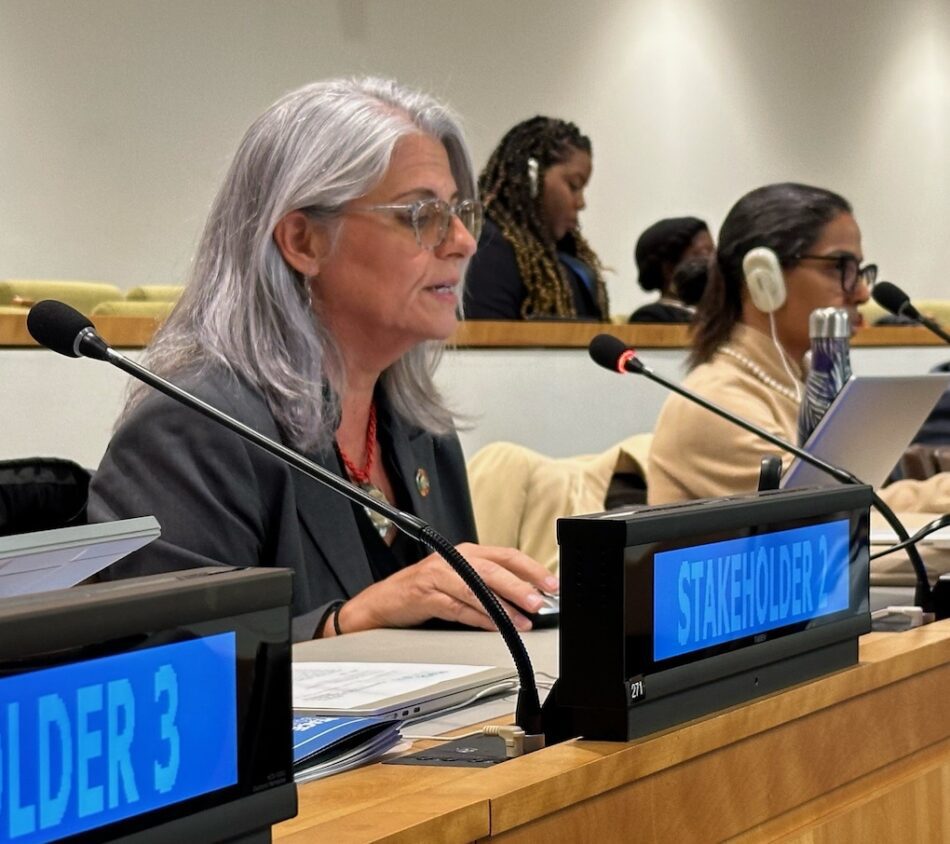CANARI calls on Governments to partner with civil society for SIDS sustainable development

New York, April 3, 2024 – The Caribbean Natural Resources Institute (CANARI) has called on Governments negotiating the next 10-year Plan of Action for sustainable development in Small Island Developing States (SIDS) to expand and deepen collaboration with civil society to address critical sustainable development challenges.
CANARI’s Executive Director, Nicole Leotaud, made a statement to the Second Session of the Preparatory Committee meeting at the United Nations in New York, April 1-5, 2024. The Committee is negotiating the outcome document which will be presented at the 4th International Conference on Small Island Developing States (SIDS4), being held May 27-30, 2024, in Antigua and Barbuda.
Ms. Leotaud proposed that, “the SIDS4 conference and development of a new inter-governmental 10-year Plan of Action for sustainable development in SIDS offer an opportunity for Governments, their regional bodies and their development partners to expand and deepen collaboration with civil society to address four key unmet sustainable development challenges: meaningful civil society participation in development decisions and initiatives; transitioning to an economy that is both environmentally sustainable and just; leaving no one behind by addressing the needs of the most vulnerable and marginalised; and protecting nature as a foundation for resilience.”

CANARI’s Executive Director, Nicole Leotaud
She noted that Caribbean civil society has significant capacity, is already playing key roles in delivering meaningful sustainable development on the ground, and is eager to support Governments along the road to sustainable development.
CANARI facilitated dialogues in January and February 2024 with over 120 representatives of civil society from across the Caribbean to elicit input into sustainable development priorities and recommendations, which CANARI has published in a recently launched document, “The Caribbean We Want: Civil society recommendations for transformative pathways to Caribbean sustainable development”.
This document outlines four key recommendations for delivering sustainable development in the Caribbean:
- Optimise the contribution of civil society through strong, mutually beneficial partnerships.
- Promote and support locally owned environmental and social enterprises.
- Incorporate environmental, social, climate and gender justice at all levels of governance.
- Pursue only development and disaster mitigation options that are in harmony with nature and aligned to social development objectives.
Ms. Leotaud also announced that CANARI is working with civil society partners across all SIDS regions to develop a “SIDS Civil Society Action Plan and Roadmap” which will be aligned with and complementary to the politically agreed inter-governmental 10-year Plan of Action. It will outline strategic roles for civil society in delivering sustainable development priorities. It will recommend actions to strengthen enabling institutional frameworks, practices and partnerships to better support civil society in SIDS to play meaningful and effective roles in delivering sustainable development. She called on Governments and others attending the SIDS4 conference to support efforts to better leverage the power of civil society as partners in developing and delivering the new SIDS sustainable development agenda.
END
Download “The Caribbean We Want: Civil society recommendations for transformative pathways to Caribbean sustainable development” here: https://bit.ly/4cI5Qji
For more information on the 4th International Conference on Small Island Developing States, see here: https://sdgs.un.org/conferences/sids2024
About CANARI: The Caribbean Natural Resources Institute (CANARI) is a regional technical non-profit organisation which has been working across the Caribbean for 30 years. Our mission is to promote and facilitate stakeholder participation in the stewardship of natural resources in the Caribbean. Our work focuses on Biodiversity and Ecosystems, Equity and Justice, Resilience and Participatory Governance. For more information on CANARI, see: https://www.canari.org/.





